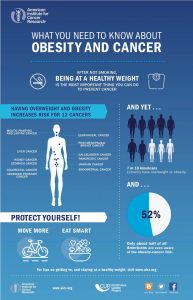Today, the American Institute for Cancer Research (AICR) and the World Cancer Research Fund launch our latest report, Diet, Nutrition and Physical Activity: Energy Balance and Body Fatness. This report focuses on the causes of weight gain, overweight and obesity.
Why is AICR, which focuses on cancer prevention and risk reduction, studying these factors? Simply put, overweight and obesity increase the risk of at least twelve types of cancer, including three (breast, colorectal and prostate) of the “big four.”
With over 70% of Americans living with overweight or obesity, this factor is projected to overtake smoking as the biggest preventable cause of cancer. Understanding the contributing factors and causes of excess body fat are key to creating policies and interventions that will help make a difference in cancer prevention.

The rigorous methods that AICR/WCRF developed for the Continuous Update Project (CUP) were indeed adapted for this report to provide the best possible assessment of the current evidence.
Key Findings
The report concludes that there is strong evidence that walking, aerobic physical activity, foods that contain fiber, following a Mediterranean-type dietary pattern and having been breastfed, all reduce risk of weight gain, overweight and obesity. Adding more of these factors to our lives will help maintain energy balance and minimize weight gain.
On the flip side, screen time, sugar-sweetened drinks, fast foods and a Western-type diet were all strongly linked to increased weight gain, overweight and obesity. Minimizing these factors in our lives will help achieve energy balance and avoid weight gain.
In addition to the strong evidence for each of these factors individually, the CUP Panel emphasized that the overall clustering of factors is more likely to impact body weight than any single factor alone.
Relevance to Cancer
Cancer risk associated with excess body fat is not confined to those with obesity; the cancer risk increases across each increasing category of body fatness, estimated by body mass index (BMI)*. The increased risk differs for each type of cancer but, for example, being in the overweight category (BMI 25-<30) increases liver cancer risk by 30%; a BMI over 30 increases that risk by 60%, compared to someone in the healthy weight range (BMI 18.5-24.9). And remember, overweight and obesity increase risk for at least 12 types of cancer.
Revealing the factors most strongly linked to developing overweight and obesity provides opportunities to target advice and strategies in controlling weight gain. If the current trend of increasing prevalence of overweight and obesity can be stopped or reversed, there is an enormous opportunity to prevent future cancer cases associated with overweight and obesity.
The Broader Context
Despite the strength of the evidence that these factors are significant drivers of weight gain, overweight and obesity, we know that energy balance interacts with a complex web of determinants that encompass economic, social and environmental factors that operate at global, national and local levels. In turn, these affect individuals directly through the availability, affordability, awareness and acceptability of healthy diets and physical activity, relative to unhealthy diets and physical inactivity.
Our new report helps us to understand the drivers of weight gain, to help inform people about making healthier choices and to support healthy public policy to create environments for individuals and communities to follow a healthy diet, be physically active and maintain energy balance.
*BMI ranges: healthy 18.5-24.9; overweight 25-29.9; obesity >30





